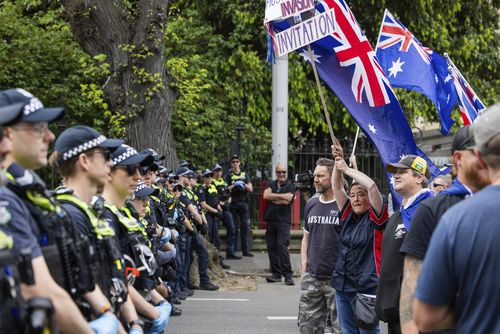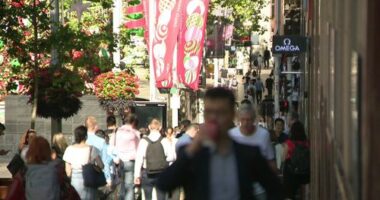Share this @internewscast.com
Lifeline’s helpline dedicated to supporting Aboriginal and Torres Strait Islander communities has experienced a notable increase in calls in the wake of the March for Australia demonstrations.
Known as 13YARN, this 24/7 hotline staffed by Indigenous crisis counselors now handles an average of 91 calls each day, amounting to 33,215 annually, according to Lifeline’s latest statistics.
These numbers mark a significant uptick from the previous year’s daily average of 65 calls, totaling 23,725 annually.

On the same day, thousands rallied against immigration across the country, a group of neo-Nazis, led by well-known white nationalist Thomas Sewell, reportedly invaded sacred Indigenous sites, allegedly attacking women and spewing racist insults.
Since then, March for Australia protests have occurred multiple times.
“The impact on the Aboriginal community has been profound, as there seems to be a lack of equivalent outrage over the racism faced by Aboriginal people,” stated Marjorie Anderson, Lifeline’s head of Indigenous affairs.
Anderson said the protests and alleged attack on Camp Sovereignty stoked a fear of personal safety within Indigenous Australians, who feel that they will not be protected in the event of an incident.


13YARN has recorded increased demand year-on-year – a trend that is only expected to continue.
The Productivity Commission’s Closing the Gap report in July found that the rates of suicide among Indigenous Australians had worsened, with 30.8 people per 100,000 taking their own lives in 2023.
Suicide accounted for about 20 per cent of deaths among Indigenous Australians under 24 between 2019 and 2023, and the leading cause of death for Indigenous children, according to the Australian Institute of Health and Welfare. 
Anderson said the crisis support hotline is “really critical” for the community. 
“It’s often the last point of call for people. We have people out in the community coming up and saying we saved their lives,” she said.

13YARN is working to get federal government support to create a text and webchat service, particularly for young people and those in domestic violence situations to access help.
“Our youth won’t ring a line, but they’ll text for help,” Anderson said.
“Let’s face it, you could be sitting on the other end of the lounge from a young person, and they’ll text you rather than talk to you.”
The service is also trying to secure more funding to hire more staff to keep up with the increasing demand.
”We are victims of our own success, but we will always make sure that those lines get answered,” Anderson said.
For 24/7 crisis support run by Aboriginal and Torres Strait Islander people, contact 13YARN (13 92 76).










